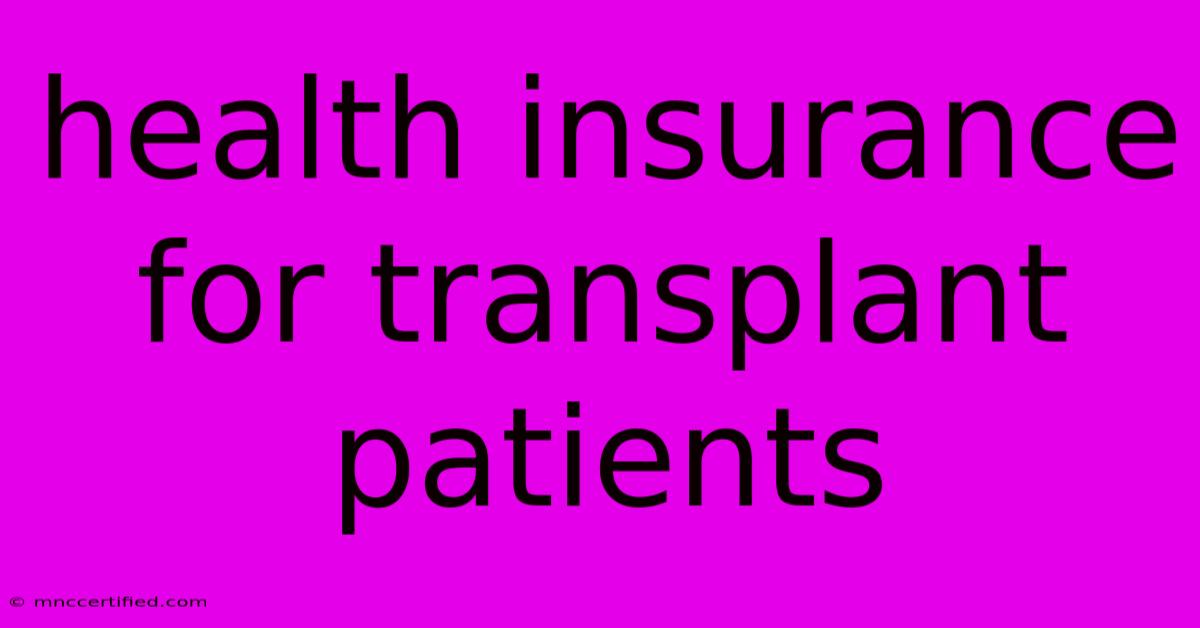Health Insurance For Transplant Patients

Table of Contents
Navigating the Complex World of Health Insurance for Transplant Patients
Receiving a life-saving organ transplant is a monumental journey, filled with hope and a renewed sense of purpose. However, the financial burden of post-transplant care can be overwhelming, especially when considering the cost of medications, regular check-ups, and potential complications. This is where health insurance plays a crucial role.
Understanding the complexities of health insurance for transplant patients can feel like navigating a maze. But with the right information, you can find the coverage you need to thrive after your transplant.
The Unique Challenges of Transplant Coverage
Transplant patients face unique challenges in their quest for adequate insurance coverage. Their needs differ significantly from those of the general population, requiring specialized plans that cater to their specific circumstances.
Here's a breakdown of the challenges:
- High Costs of Medications: Immunosuppressant drugs, essential for preventing organ rejection, are often expensive and require long-term usage.
- Frequent Doctor Visits: Post-transplant monitoring involves regular check-ups with various specialists, leading to increased healthcare expenses.
- Potential Complications: Transplant recipients are susceptible to various complications, some requiring additional treatments and hospitalization.
- Pre-Existing Conditions: Many individuals needing transplants have pre-existing conditions that can influence their eligibility and coverage.
Understanding Your Coverage Options
There are different types of health insurance plans that can cater to the needs of transplant recipients:
- Individual Health Insurance: These plans are purchased directly from an insurance company and offer flexible coverage options. However, they can be expensive, especially for those with pre-existing conditions.
- Employer-Sponsored Health Insurance: If you have employment-based coverage, your employer's plan may be your primary source of insurance. Ensure you understand the details of your plan, particularly its coverage of transplant-related expenses.
- Medicare: Individuals aged 65 and older or with certain disabilities qualify for Medicare, which provides comprehensive coverage for transplant-related care.
- Medicaid: This program assists low-income individuals and families with healthcare expenses, including those requiring transplants. Eligibility requirements vary by state.
Key Considerations for Transplant Coverage
When seeking health insurance, it's essential to consider these key factors:
- Coverage for Immunosuppressant Medications: Ensure your plan covers the full cost or a significant portion of these essential drugs.
- Out-of-Pocket Costs: Understand the deductible, copayments, and coinsurance associated with your plan, as they can significantly impact your financial burden.
- Network of Providers: Verify that your plan includes access to a network of experienced transplant specialists and hospitals.
- Pre-Existing Conditions: If you have pre-existing conditions, confirm that your plan covers them and does not exclude coverage based on your medical history.
Tips for Finding the Right Coverage
Navigating the world of health insurance can be daunting, but these tips can help you find the right plan:
- Seek Guidance from Your Transplant Team: Your doctors and transplant coordinators can provide invaluable advice on navigating insurance options and finding the best coverage.
- Compare Plans and Coverage: Use online resources like healthcare marketplaces or insurance brokers to compare different plans and their costs.
- Consider Special Programs: Research patient assistance programs or foundations that offer financial assistance to transplant recipients.
Building a Secure Future with Health Insurance
Having appropriate health insurance after a transplant is vital for long-term well-being and financial security. With the right plan, you can access the care you need, manage your out-of-pocket expenses, and focus on your recovery and rebuilding your life.
Don't hesitate to seek help from healthcare professionals or insurance specialists to navigate this complex landscape. Remember, knowledge is power, and understanding your insurance options empowers you to make informed decisions about your health and financial future.

Thank you for visiting our website wich cover about Health Insurance For Transplant Patients. We hope the information provided has been useful to you. Feel free to contact us if you have any questions or need further assistance. See you next time and dont miss to bookmark.
Featured Posts
-
Germanys Merz Calls For Faster Topic Timeline
Nov 08, 2024
-
Uk Interest Rates Fall To 4 75
Nov 08, 2024
-
What Insurance Does Campbell Clinic Take
Nov 08, 2024
-
Aclu Californias Stand On Trump Reelection
Nov 08, 2024
-
Outer Banks Cast Reacts To Event News
Nov 08, 2024